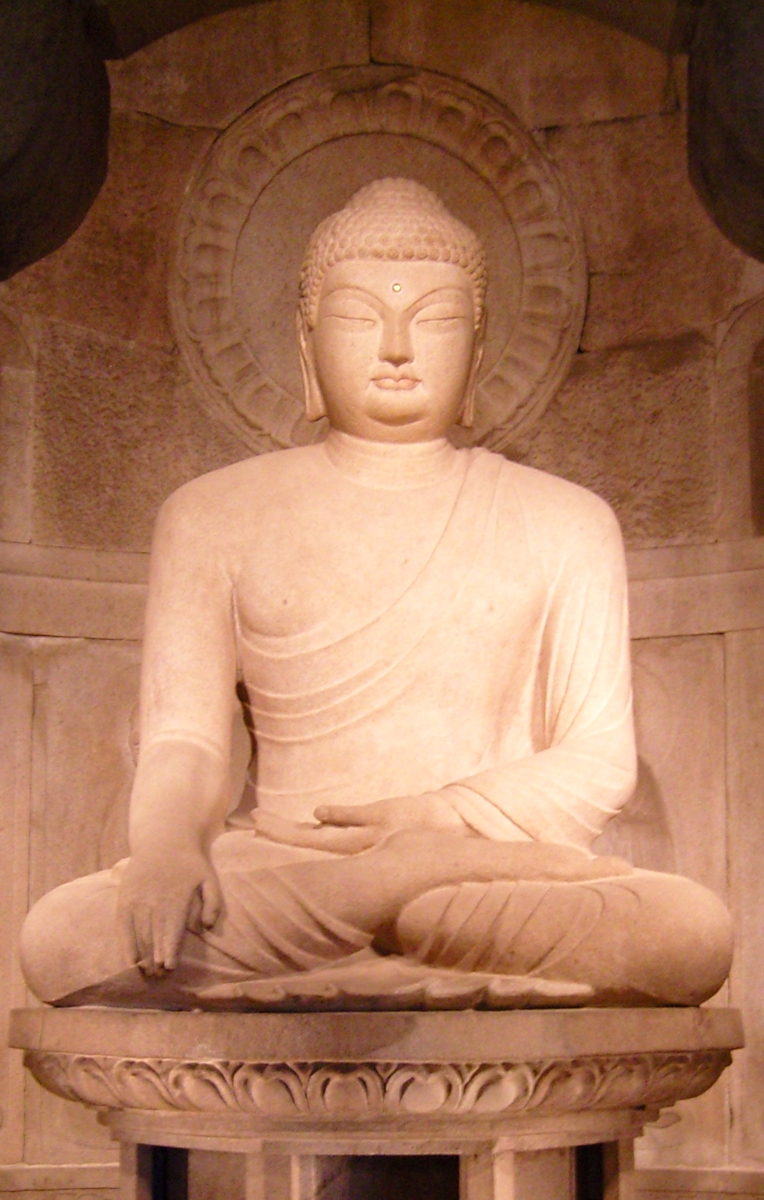
 |
||
| The Seokguram Grotto, Gyeongju, South Korea. | ||
It's hard to believe, but it really has been six months since we last sent out a proper report. We did, however, post a crossword puzzle on Israel's genocide of the Palestinians in Gaza to explore the issue which has occupied us in recent months. Immediately after the puzzle was distributed, we received several reactions and praise. Sadly, that initial interest seems to have disappeared. Noone seems to have finished the puzzle to claim the prize, and we received only one request for the solution--that from a friend who had gotten three-quarters of the way through but had fallen sick and was unable to finish. Frankly, we had hoped it would be useful as an educational tool. Deep sigh.
 |
||
| AP News | ||
For us in Kandy, life goes on. We value friendships, old and new, and are grateful whenever a message pops up in our Inbox. We try to respond to all mail, though we must admit that sometimes our email program seems erratic, and we fear that we miss some letters. We are working to solve that problem, but it has been tough to find a program which sends and receives reliably. Also, we strongly suspect that email itself is becoming obsolete. More and more, friends seem to be turning to social media, WhatsApp, Facebook, Messenger, and LinkedIn. We admit that we are old-fashioned and prefer email. Visakha does not even have a smart phone, but she does spend a lot of time on Facebook, as an avenue for her human rights activism, to stay abreast of the world situation, especially Gaza and Burma/Myanmar and the insanity that is US politics, and to keep in touch with friends, former students, family, refugees, monastics, teachers, and activists: Burmese, Khmer, Hmong, Filipino, Dalit, Vietnamese, Korean, Thai, Mon, Rohingya, et al.
"The times, they, are a-changing," and we just don't want to lose anyone!!
Here's some of our news from the first half of the year, though not in any particular order:
Here in Kandy, we are grateful to be able to work with friends, local shops, and other organizations to get food and medicine to those in real need due to the Sri Lankan economic crisis. With generous donors who know us, we are able to help a lot of people, even though we cannot do anything to change the overall situation. Our generosity is a source of great joy to us. May we always be able to do something!
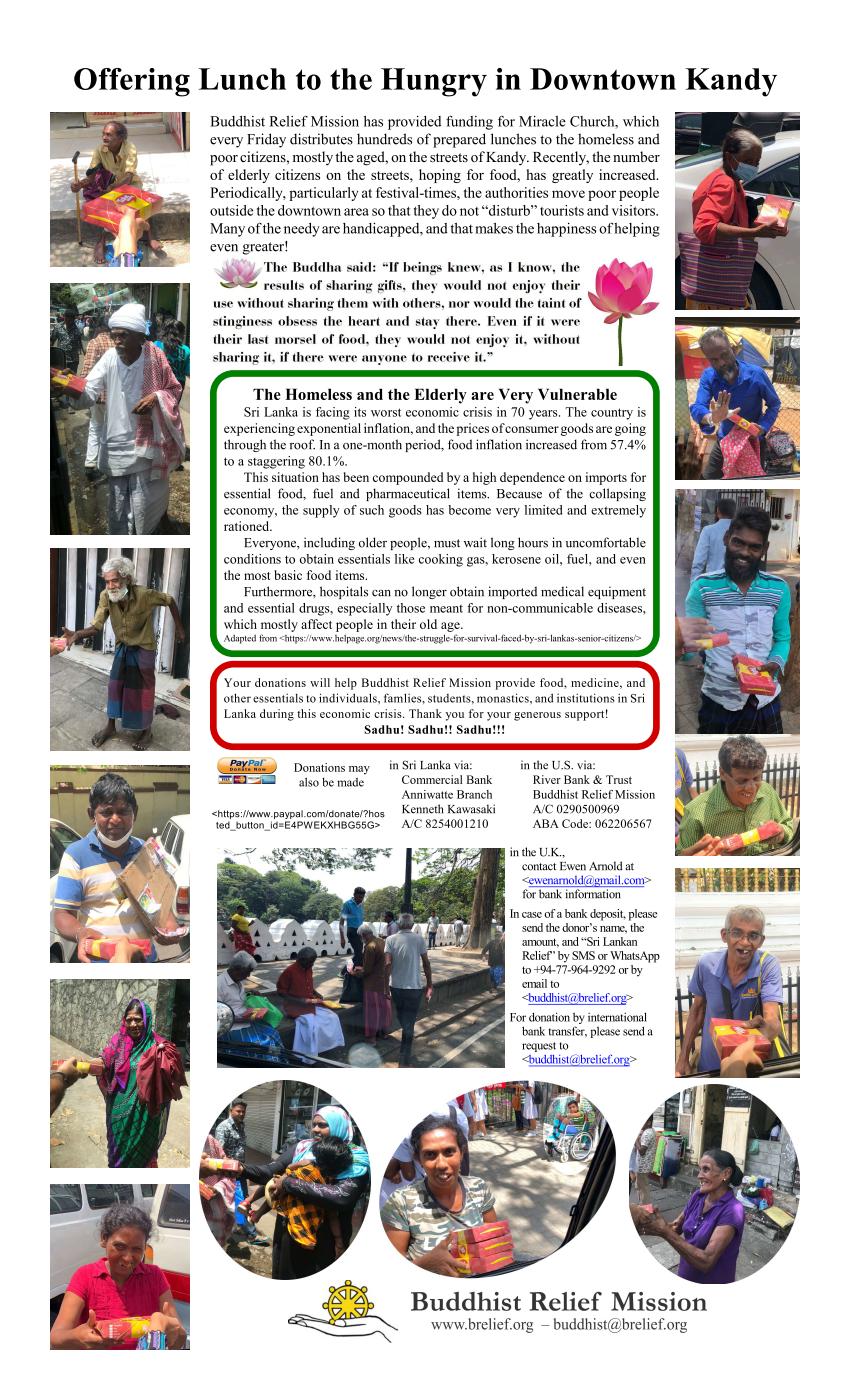 |
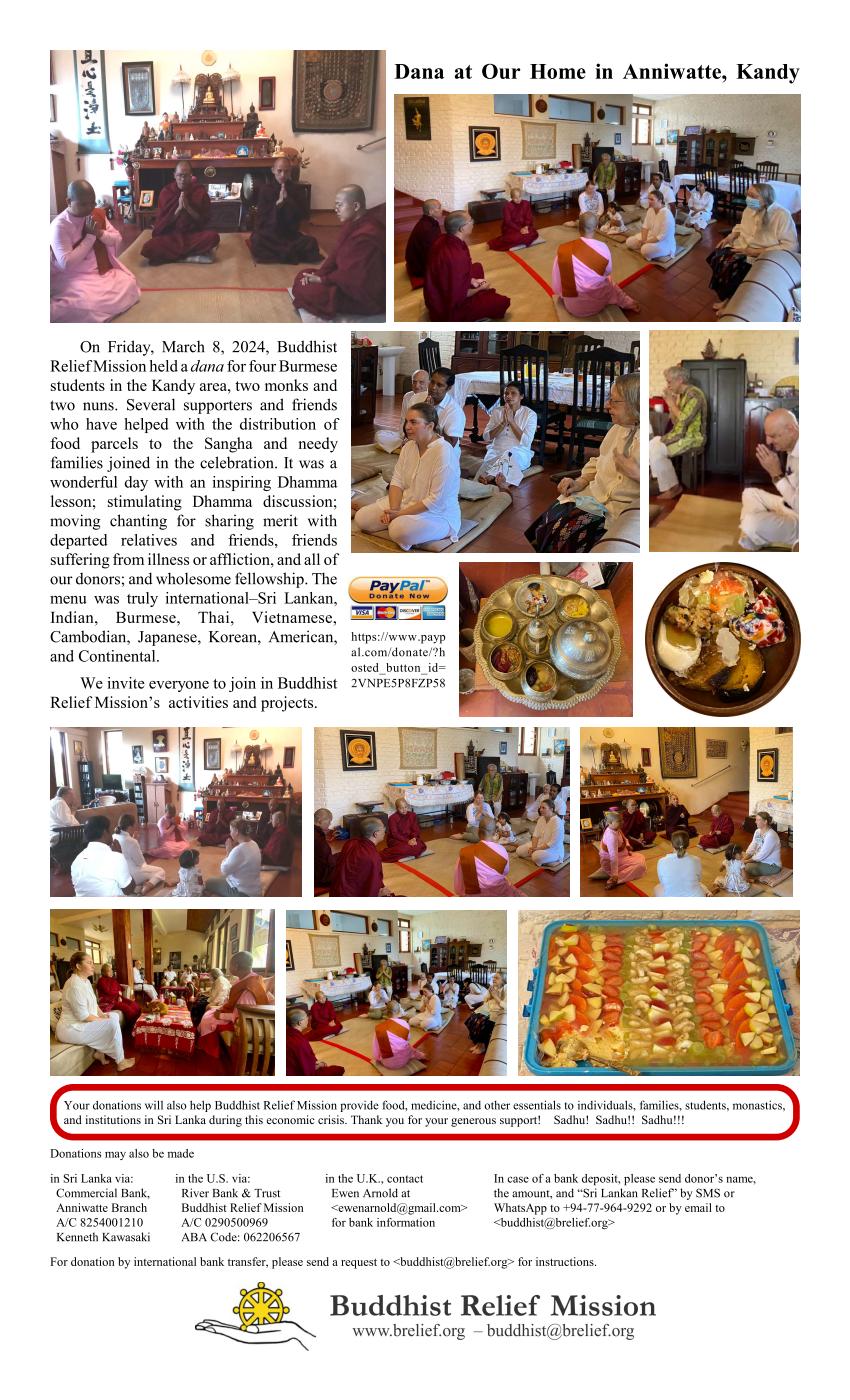 |
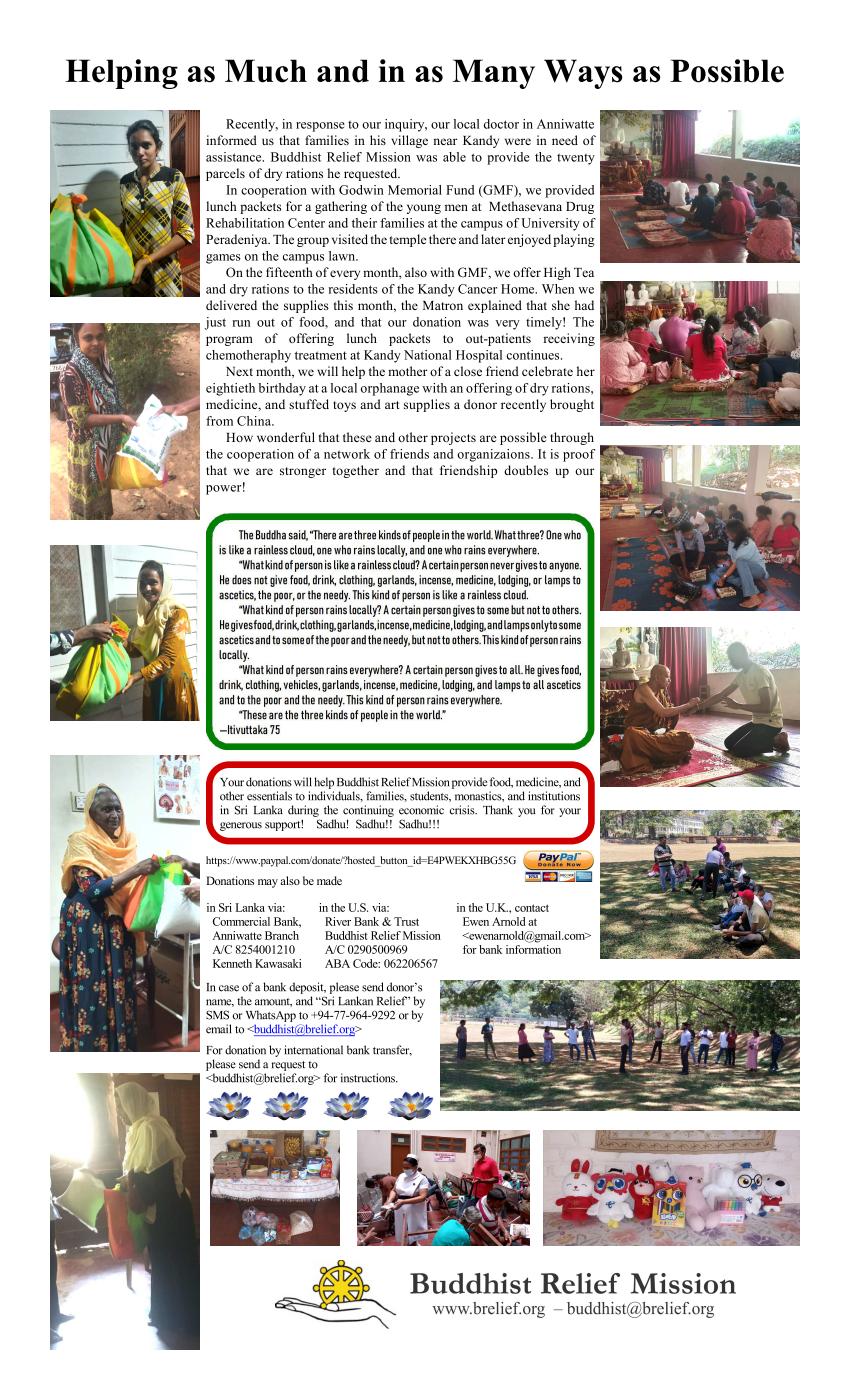 |
 |
 |
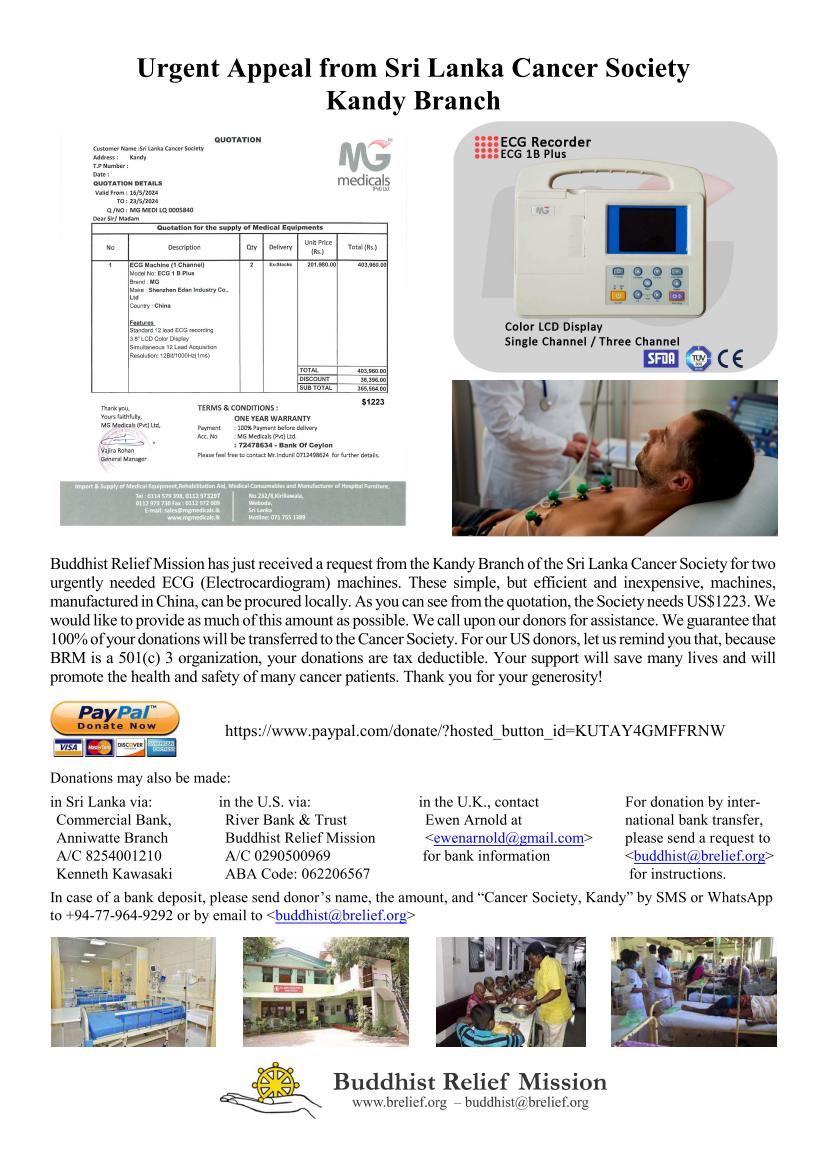 |
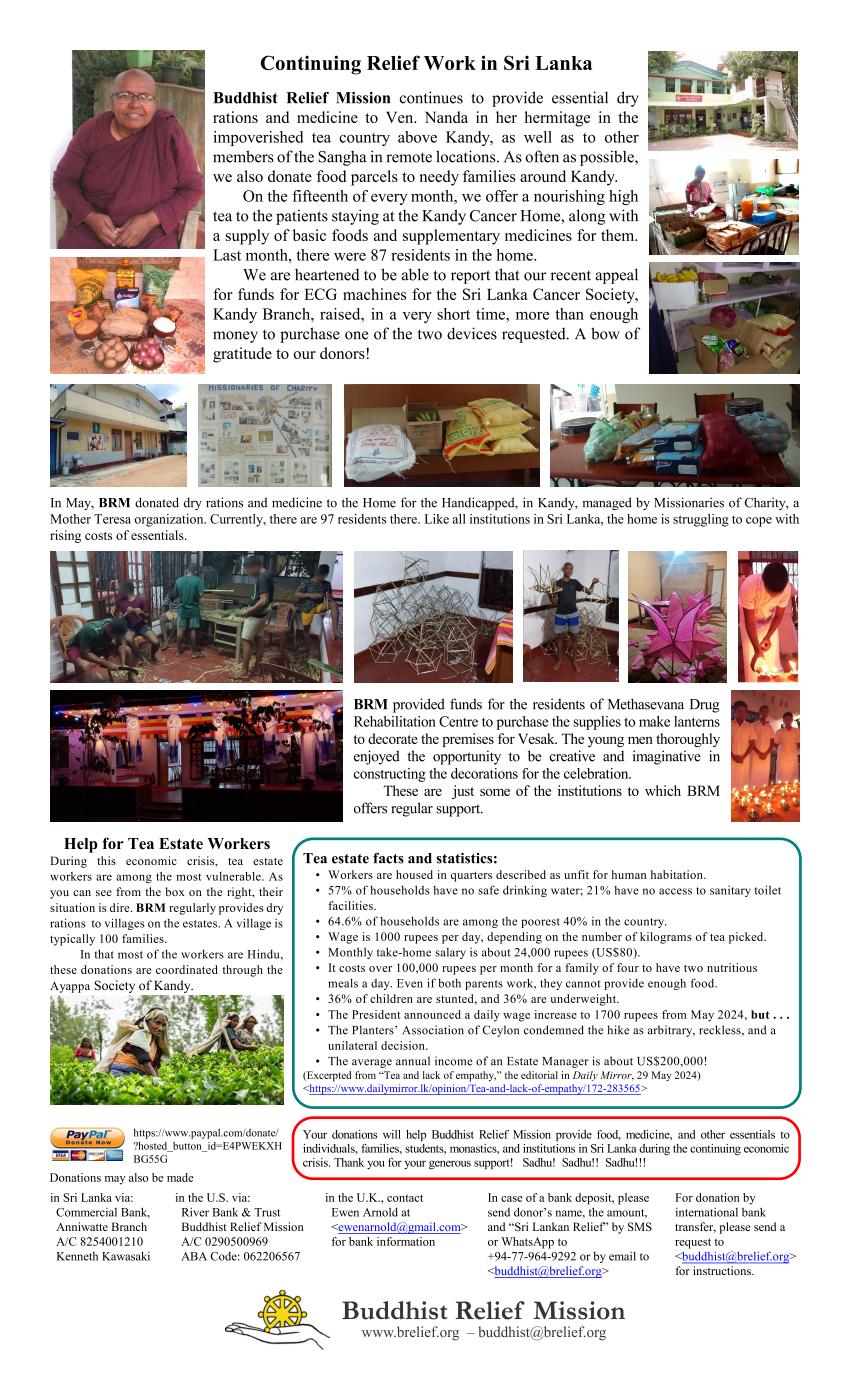 |
||||
| These are the relief flyiers we have issued since our last report. Click each one to view the PDF large. | ||||||||||
 At the end of April, Visakha broke out in ugly red blisters on the right side of her back and a few on her chest. Ken thought for a few minutes and then announced, "I think you have shingles." He had suffered from milder cases twice in the past, and his diagnosis was spot on!
At the end of April, Visakha broke out in ugly red blisters on the right side of her back and a few on her chest. Ken thought for a few minutes and then announced, "I think you have shingles." He had suffered from milder cases twice in the past, and his diagnosis was spot on!
 We promptly consulted our local physician, Dr. Salahudeen (trained in Cuba), who prescribed both ointment and pills to ease the blisters and to prevent any new infection from taking advantage of Visakha's low immunity. Ashoka mentioned a traditional treatment--sleeping on Neem leaves and brought branches from a neighbor's tree. The leaves were, indeed, very soothing. For a week, Visakha slept on a layer of Neem leaves, kindly provided also by Lily, Nimal, and Mike. Lily ground Neem leaves into a paste, which she spread on Visakha's torso to cool and comfort the angry blisters. After the blisters finally subsided, Lily continued with a daily ayurvedic oil massage, which also eased arthritis pain in the shoulders. Visakha also deeply appreciated the concern both Leo and Michelle showed, by spending lots of time sleeping with her! The obvious symptoms of the shingles have disappeared, but residual effects, including weakness, random nerve flareups, minor hearing loss, and body ache have continued. She realizes how fortunate she is to be so well-looked after. Other friends have endured Shingles on their own, and she can't imagine how hard that must have been. Still, being sick gave her precious time for wise reflections on the shortness of life and the inevitability of death. It has been a good opportunity to watch both mind and body. Sleep wasn't easy, but the time resting allowed images she'd seen on Al Jazeera TV news and various websites to slide through her mind: images of beautiful Palestinian families, grieving parents, bewildered elders, frightened children, dedicated doctors and nurses, and tireless workers searching through rubble. Waves of metta and karuna arose with those pictures, and, for the time being, her self was forgotten.
We promptly consulted our local physician, Dr. Salahudeen (trained in Cuba), who prescribed both ointment and pills to ease the blisters and to prevent any new infection from taking advantage of Visakha's low immunity. Ashoka mentioned a traditional treatment--sleeping on Neem leaves and brought branches from a neighbor's tree. The leaves were, indeed, very soothing. For a week, Visakha slept on a layer of Neem leaves, kindly provided also by Lily, Nimal, and Mike. Lily ground Neem leaves into a paste, which she spread on Visakha's torso to cool and comfort the angry blisters. After the blisters finally subsided, Lily continued with a daily ayurvedic oil massage, which also eased arthritis pain in the shoulders. Visakha also deeply appreciated the concern both Leo and Michelle showed, by spending lots of time sleeping with her! The obvious symptoms of the shingles have disappeared, but residual effects, including weakness, random nerve flareups, minor hearing loss, and body ache have continued. She realizes how fortunate she is to be so well-looked after. Other friends have endured Shingles on their own, and she can't imagine how hard that must have been. Still, being sick gave her precious time for wise reflections on the shortness of life and the inevitability of death. It has been a good opportunity to watch both mind and body. Sleep wasn't easy, but the time resting allowed images she'd seen on Al Jazeera TV news and various websites to slide through her mind: images of beautiful Palestinian families, grieving parents, bewildered elders, frightened children, dedicated doctors and nurses, and tireless workers searching through rubble. Waves of metta and karuna arose with those pictures, and, for the time being, her self was forgotten.
Happily, Visakha could join the regular sessions of our Sunday Zoom class on Buddhism and Non-violence, though she was not able to participate in the pindapata on May 26. She surely benefitted very much from the visits by Ven. Jinasiri and Ven. Mettajiva and by Ven. Mettajiva's bedside paritta chanting. She attributes her recovery also to the healing, strengthening chants and prayers from Ven. Gong Pa Sunim in Korea, Ven. Ariyawantha and other monks at Bodhisukha, and many other friends near and far. Deep thanks to all who sent their comforting support and to all caregivers and friends for their kindness and love.
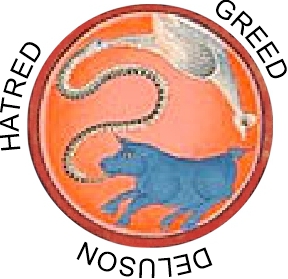 Shingles is an interesting disease. After a bout of chickenpox in childhood, the virus remains latent in the body for the rest of one's life. Whenever a person's immunity is low, the virus may take the opportunity to erupt as shingles. It's not too fanciful to compare this virus to human greed, hatred, and delusion, which lie dormant within individuals and societies until conditions are ripe. When the opportunity presents itself, these ugly defilements erupt in anger, hatred, violence, and cruelty. When a society's commitment to fundamental human rights, justice, equality, harmony, and fairness are weakened or disgarded, the results will be suffering; an outbreak of bigotry, hyper-nationalism and discrimination; attacks on the rights of workers, minorities, women, the homeless, and refugees; the breakdown of proper governing; bribery; power-politics; disinformation; and propaganda.
Shingles is an interesting disease. After a bout of chickenpox in childhood, the virus remains latent in the body for the rest of one's life. Whenever a person's immunity is low, the virus may take the opportunity to erupt as shingles. It's not too fanciful to compare this virus to human greed, hatred, and delusion, which lie dormant within individuals and societies until conditions are ripe. When the opportunity presents itself, these ugly defilements erupt in anger, hatred, violence, and cruelty. When a society's commitment to fundamental human rights, justice, equality, harmony, and fairness are weakened or disgarded, the results will be suffering; an outbreak of bigotry, hyper-nationalism and discrimination; attacks on the rights of workers, minorities, women, the homeless, and refugees; the breakdown of proper governing; bribery; power-politics; disinformation; and propaganda.
The breakdown of international law and human rights is like the weakening of humanity's immune system which has allowed Fascist Zionism to destroy normal decency, pity, and empathy. Because our societies' resistances are low, wrong has been declared right. How easily wisdom and morality have been swept away by lies, propaganda, and ... money. War! What is it good for? Absolutely nothing but PROFIT! In our sick, modern world, war is so profitable that it seems impossible to stop it. The Pentagon budget alone is approaching one trillion dollars, all intended for death and destruction.
Paraphrasing Robert Koehler, since we were able to abolish slavery, why can't we abolish war? Here are two classic statements of the horrors of war. The painting is well-known; the poem by Mark Twain is not, and we were very surprised to have discovered it.
Recently, quite a few friends have told us that they don't read newspapers or watch the news on TV because they don't want to be depressed. They certainly don't want to see what is happening in Gaza. Of course, the situation there is horrendous, but we feel that it is important to know what's really happening (Beware of propaganda!) and to try to understand why (Beware of lies with big money behind them!), to talk about it, and to work to stop the the devastation and genocide. We can support those who are bravely telling the truth of what is happening in our benighted world. We can also speak out and use our political power to demand changes. Obviously, the way the world is headed is wrong, cruel, and dangerous, and we must change course before it's too late! All praise to those who are speaking out, singing out, protesting, writing letters, sharing real news and probing analyses of the mess the world is in. Good for the activists, who are willing to risk their positions and their reputations for the truth! Bless Aaron Bushnell, who mindfully sacrificed his life for Free Palestine! If we understand the real extent of the suffering and its Fascist roots, we can extend compassion to the refugee families, the exhausted doctors, the relief workers, the hungry children, the grief-stricken, the starving, the weary donkeys pulling carts loaded with families and their pitiful belongings from one dangerous place to another, and the exhausted journalists reporting from the rubble and chaos. We can also support those organizations--UNRWA, Doctors Without Borders, Red Crescent, and others--which are providing aid to the Palestinians. Admittedly, it's not easy, but we must also try to stop our government's complicity in this horrific injustice, and all the other wrongs, foreign and domestic, being committed in our name with our tax dollars! More difficult than that, perhaps, we must also try to generate compassion for the brutal Israeli soldiers and rabid Zionists everywhere, who delight in Palestinian sufferring. as well as for soldiers and police elsewhere who are creating bad karma and terrible future suffering for themselves with their violence, bigotry, and hatred. Finally, we must send loving-kindness to all-- to the ignorant rabid Zionists who attack relief convoys, destroying food intended for starving, exhausted refugees; to those who wield guns and kill without apparent reason; and to the deluded world leaders, businessmen, and bureaucrats who profit from all this wicked injustice and make it possible.
Since our last report, we've been assailed by weather extremes--horrific heatwaves and drought, followed by torrential rains and raging winds. One morning, a coconut palm tree beside the house fell dramatically. Fortunately, it fell parallel to the house, over the back fence. Had it hit the house, it would certainly have broken the roof and caused extensive damage. Like war, climate change now is everywhere threatening misery and mayhem, killing people and animals, destroying the environment, causing immense suffering, spreading diseases, and creating refugees. We recently learned that rising sea levels are threatening the island of Tuvalu in the South Pacific, and hundreds of indigenous families have been forced to evacuate the Panamanian island of Gardi Sugdub.
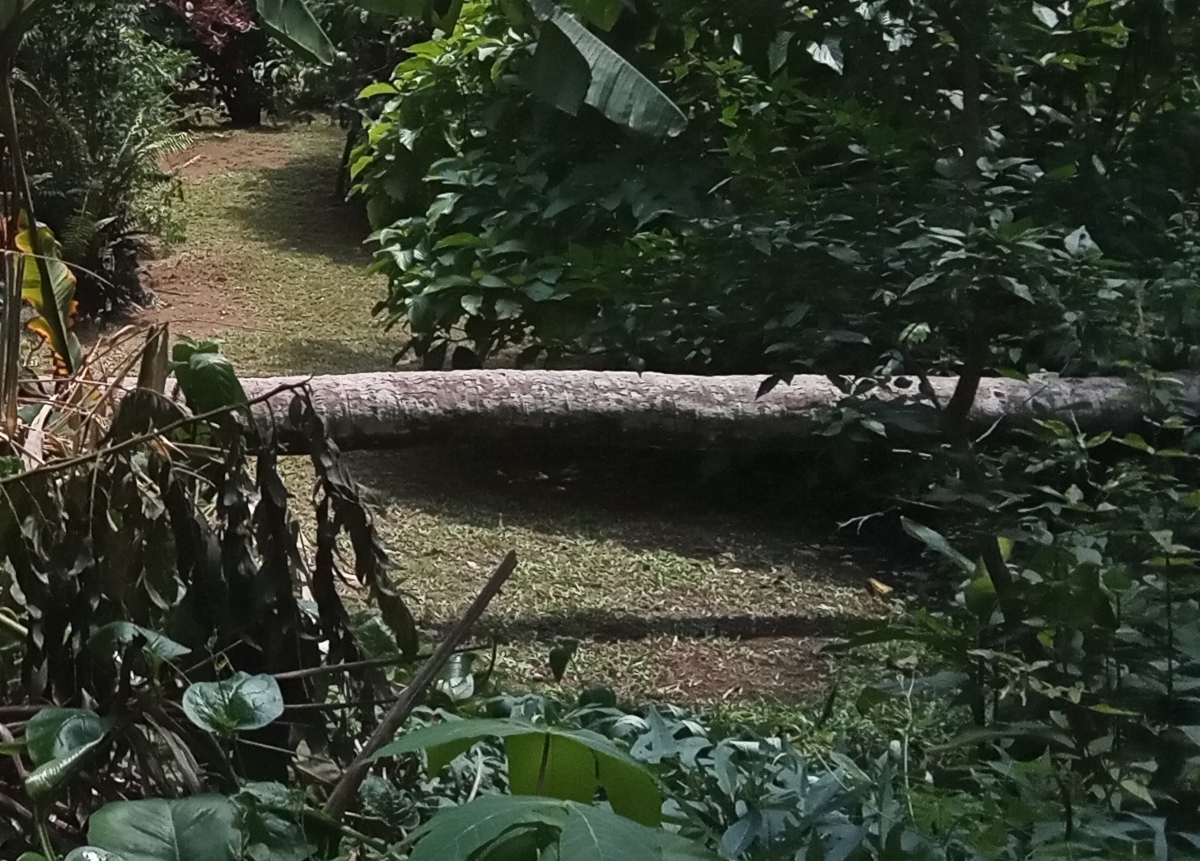 |
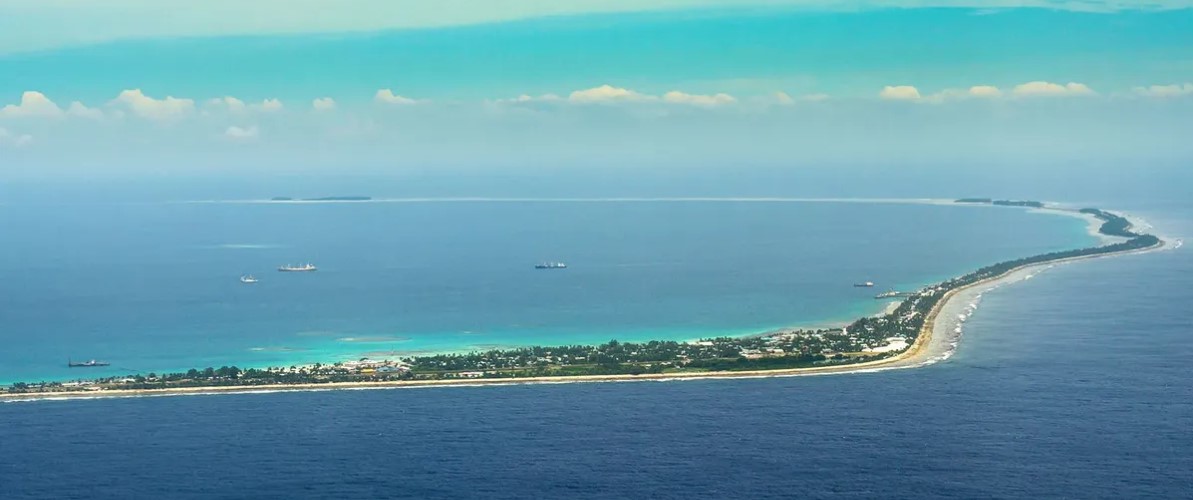 |
 |
||||
|
Tuvalu
Getty Images/imageBROKER/Michael Runkel |
Gardi Sugdub AP Photo/Matias Delacroix |
|||||
| The fallen coconut tree beside our house | ||||||
In the last report, we mentioned several European SERVAS visitors. Happily, the visits have continued. In February, we had two SERVAS guests from France, Odile and Stephanie. Odile, a SERVAS coordinator from Lyons, stayed only two nights, but Stephanie was with us for quite a while, meeting friends in Kandy and offering her services as psychologist and counselor. The same as others who have been bitten by the "Sri Lanka bug," Stephanie is considering returning to reside in Sri Lanka, and Kandy is the preferred location. We hope that she is able to make all the arrangements. It would be lovely to have her as part of our community. In June, Gill and her daughter, Zoe, from Bristol, England, stayed with us for several days. We reminisced quite a bit about our travel with SERVAS in 1979. We remember that, during a walk with the SERVAS family in Bristol, we looked across into Wales and saw a fox jumping through the tall grass. That was the only time Ken had ever seen a wild fox, and Visakha had not seen one since whe was a child. While Rolf, our SERVAS guest from Germany (mentioned in our previous report) was wtih us, the family which runs the local general store in Anniwatte, commonly called "The Tamil Shop," where we purchase most of our dry ration donations, visited us, bringing their daughter and her two children who are living in Australia.
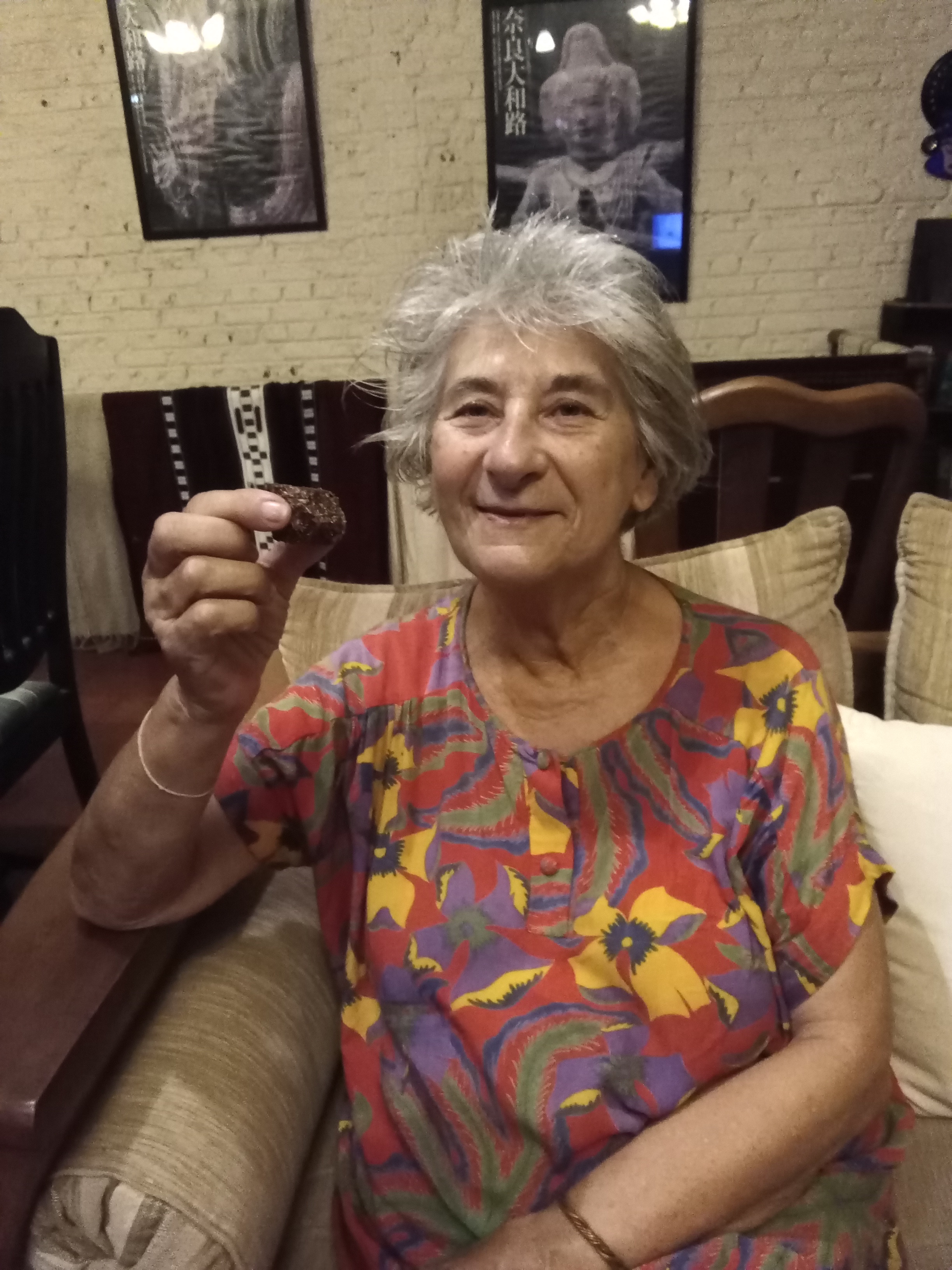 |
 |
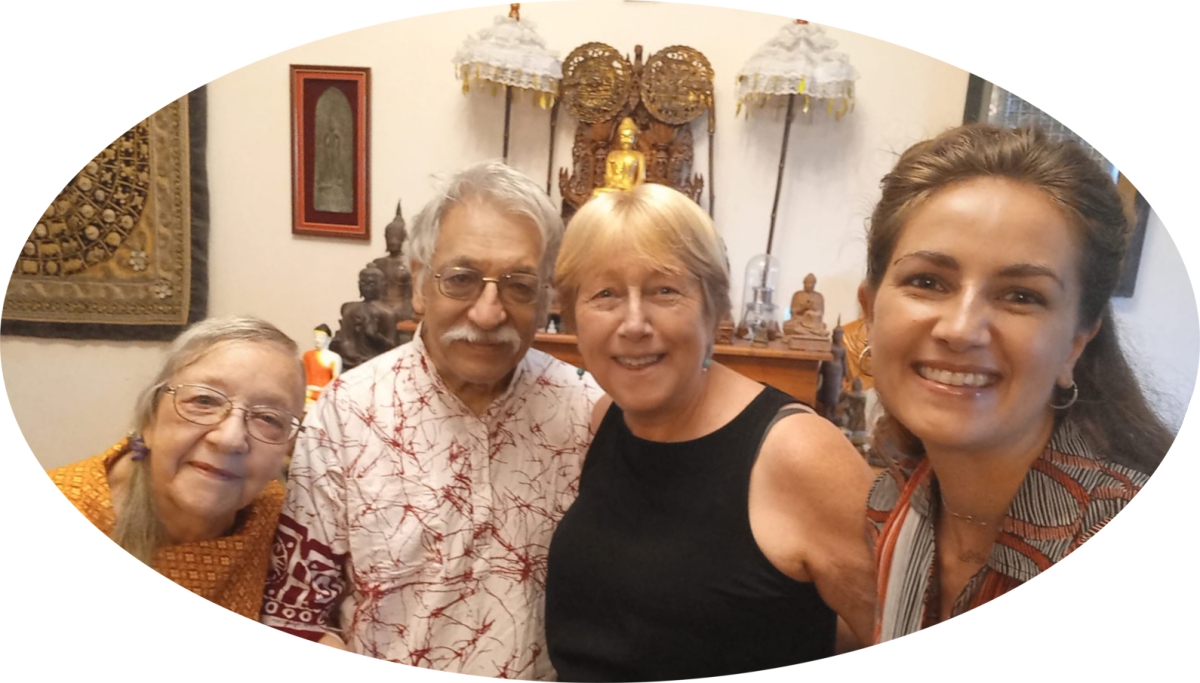 |
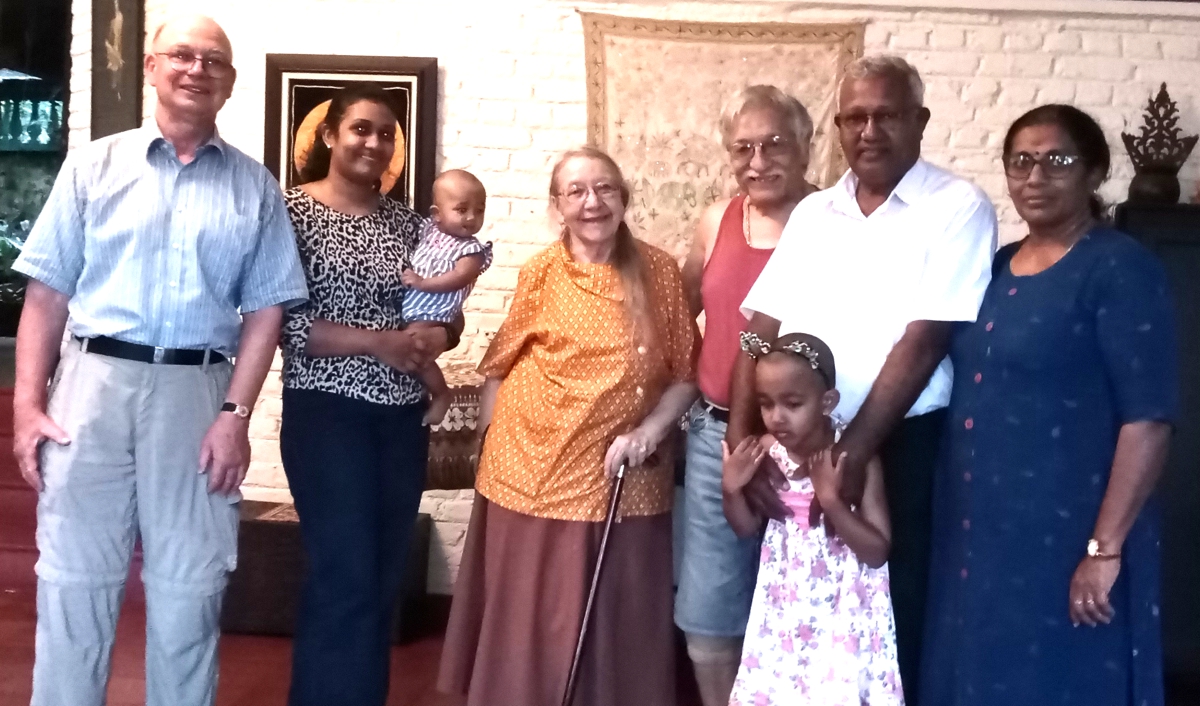 |
||||||
|
Odile
|
Stephanie
|
Visakha, Ken, Gill, and Zoe
|
Rolf with the family from the Tamil Shop
|
||||||
|
Click each photo to view it larger.
|
|||||||||
Stepping out of the past were also several special guests from Thailand and Japan. Jason, the Canadian journalist, whom we first met in Japan via Valerie and who has been deeply involved with Burmese issues for more than twenty years, made his third visit to Sri Lanka. It was a working vacation (more work than vacation), and he spent eight hours a day, five days a week, on the computer and the internet, but we still had plenty of time to talk. In June, Keiko, who assumed the directorship of Burmese Relief Center--Japan when we left, came for a week with Ryoko, one of her staff, who spent a year working with Dr. Cynthia at Mae Tao Clinic in Mae Sot, Thailand. Being Japanese, Keiko has developed BRC-J in ways that we were never able to accomplish. She has carried the message to many other groups and universities and has recruited hundreds of activists to work for Burmese democracy and refugee relief. She has even approached the Japanese government and become something of a consultant on Burmese affairs! All kudos to her for her dedication and stamina! Keiko brought us a wonderful gift from Maung Maung Tinn, the Karen refugee artist at Mae Tao--his latest book, Born Free and Equal, an illustrated Universial Declaration of Human Rights for children, in five languages. It should be used in schools everywhere, and we hope we can get it into the schools in the Rohingya refugee camps in Bangladesh.With all three of these guests we were delighted to catch up on many mutual friends in both Japan and Thailand.
 |
 |
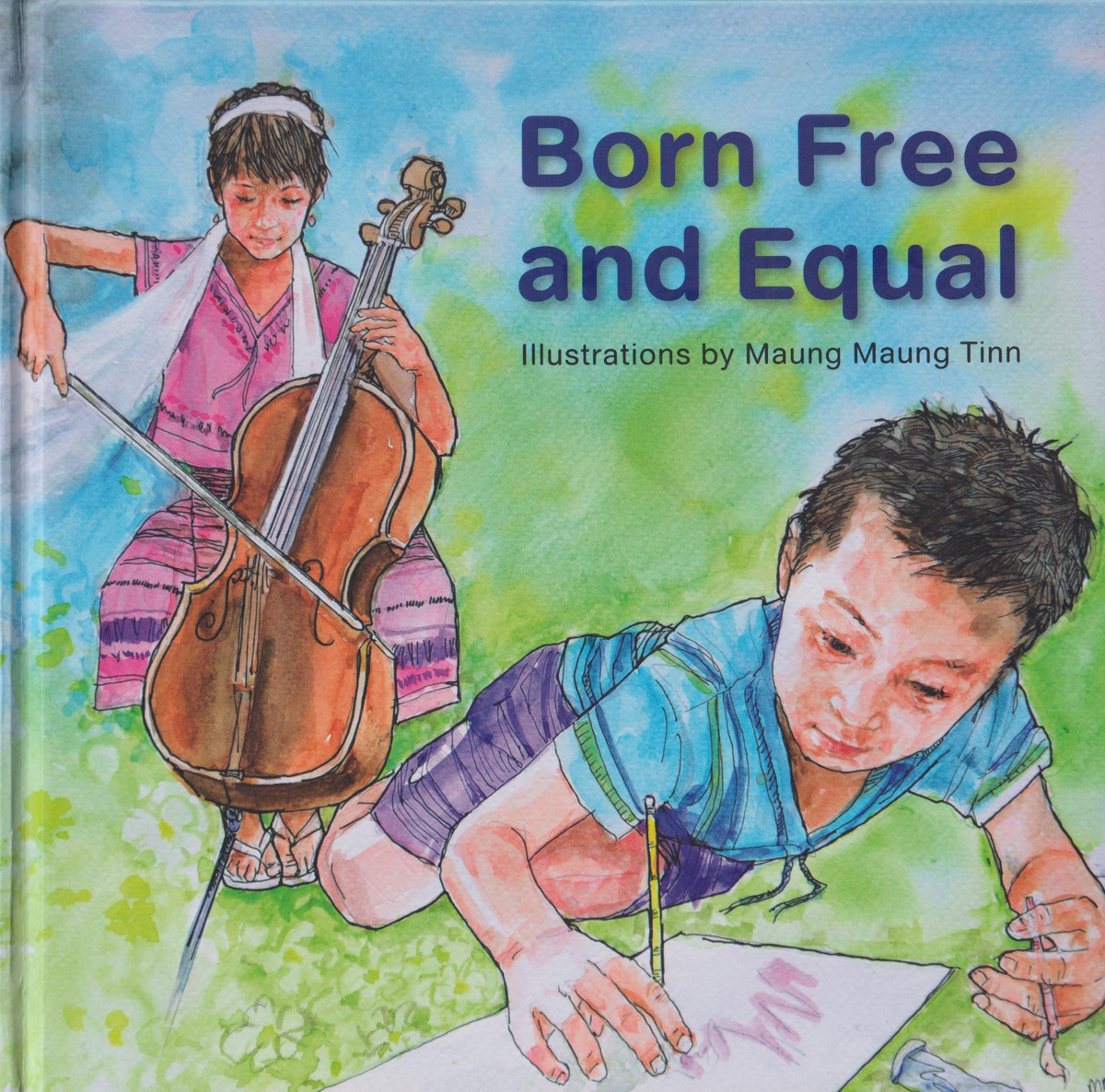 |
 |
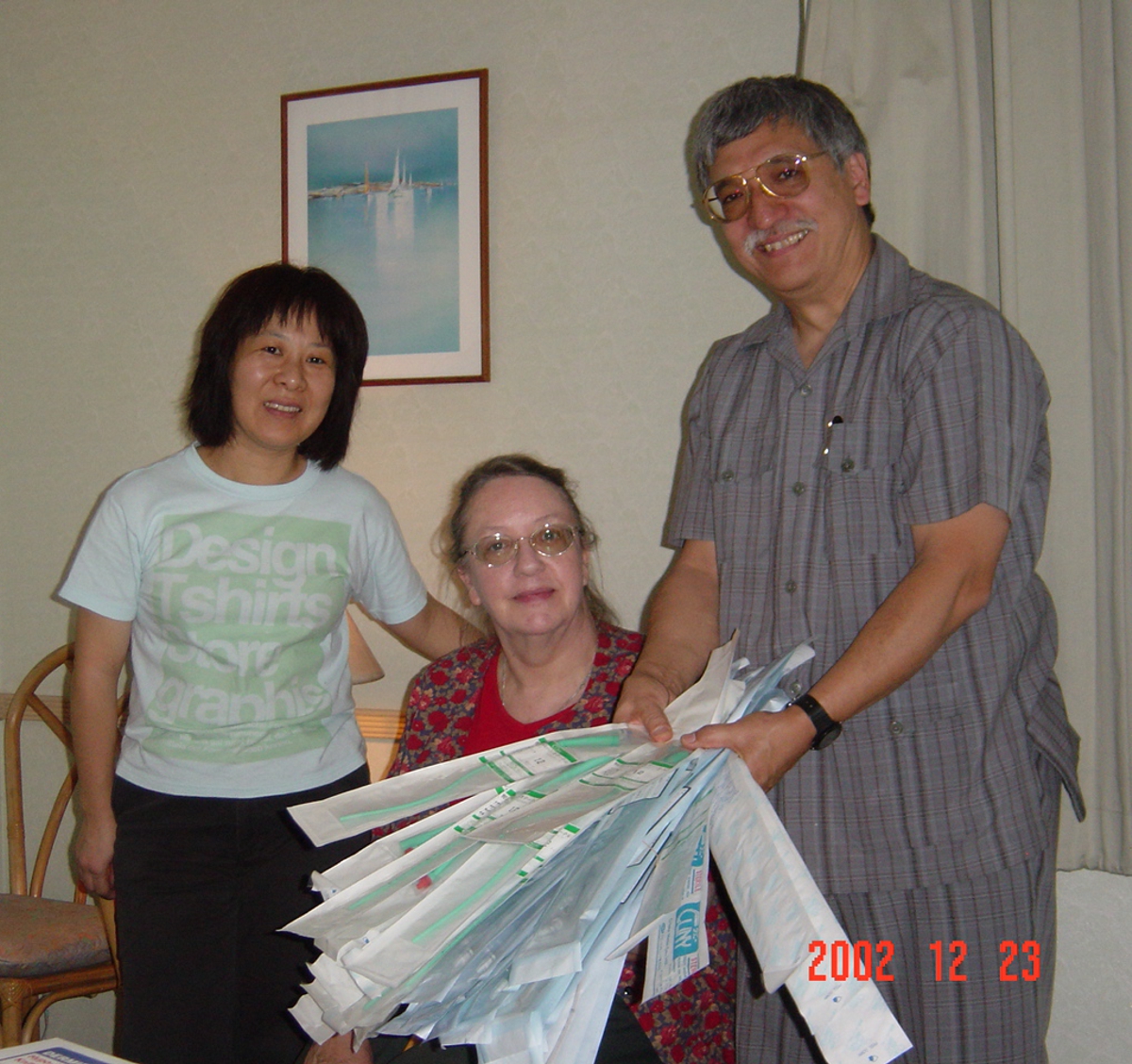 |
||||||
|
The entire book in PDF
|
||||||||||
|
Jason
|
Keiko, Ewen, Ken, Ryoko, Mohan, and Visakha
|
Click this image to view a PDF sample of this book.
|
With Keiko in Thailand in 2002
|
|||||||
One morning, while Keiko and Ryoko were here, we got a call from Mohan, Director of the Kandy Cancer Home, asking if we could manage lunch for him and Ewen who was shortly to be returning to England for an extended visit with his elderly mother. The timing was perfect, and we quickly conferred with Lily, who managed to whip up an eight-course dejeuner by one o'clock! It was a scrumptious meal, and we're grateful to everyone for being the occasion for such a pleasant afternoon!
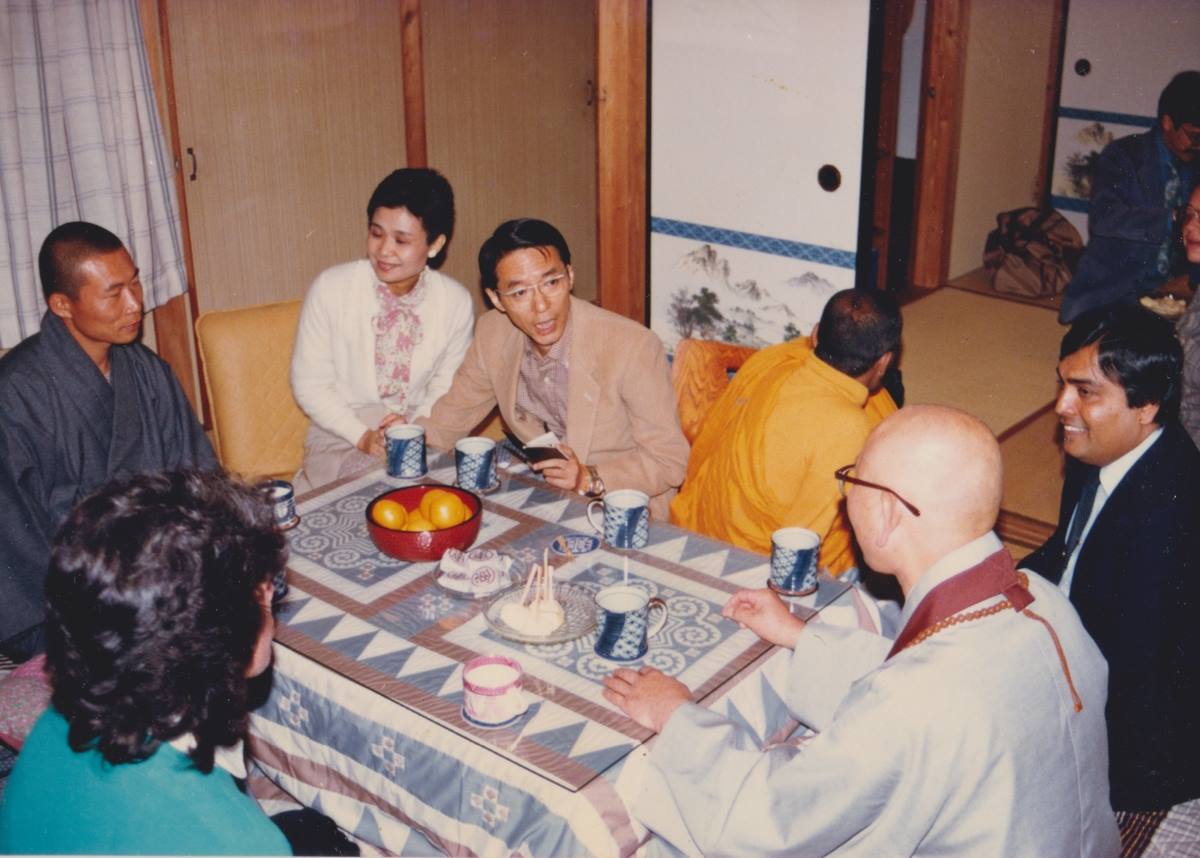 |
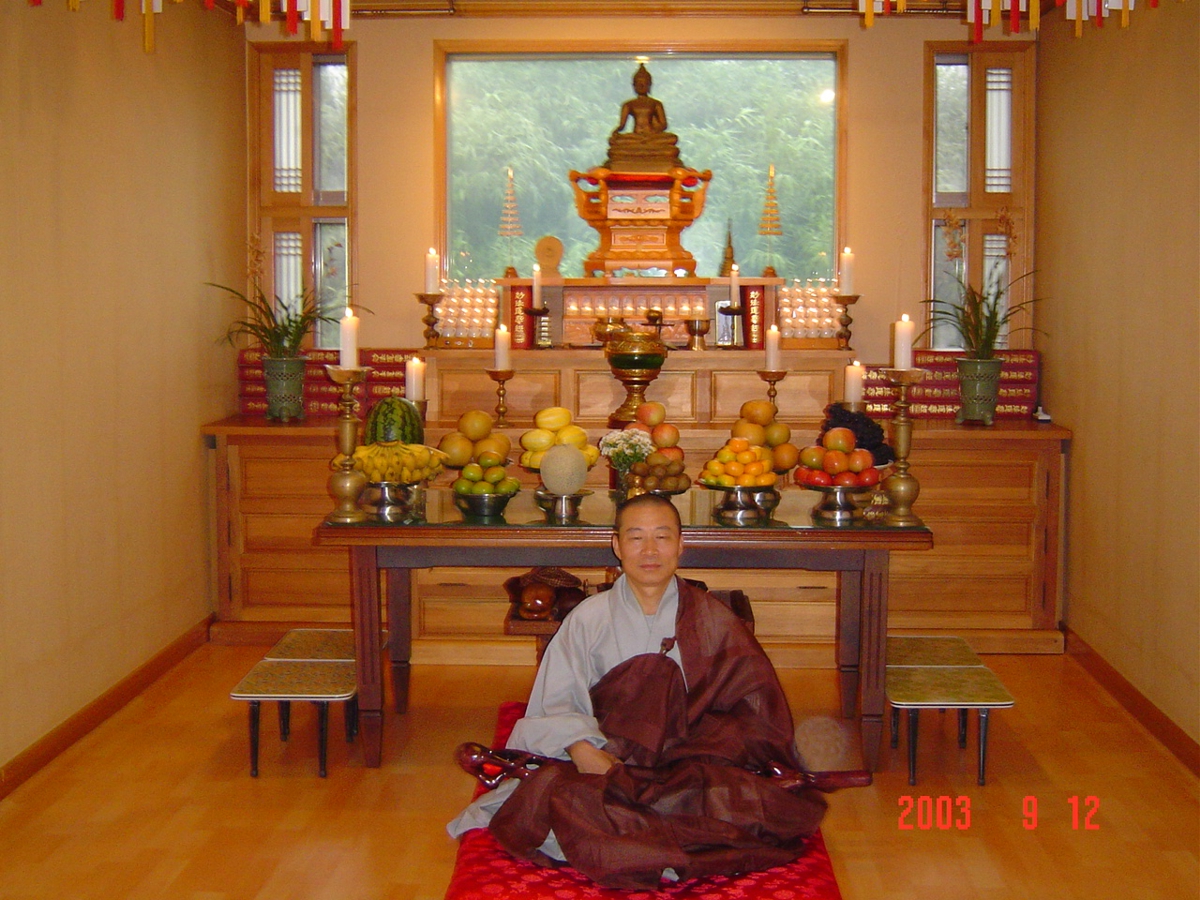 |
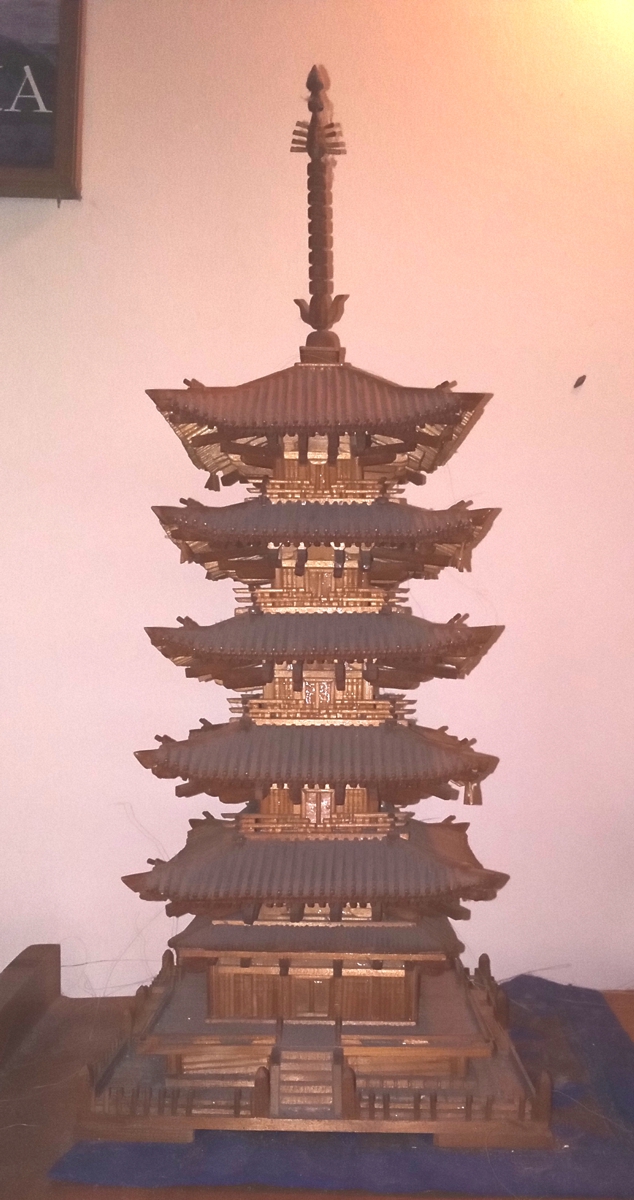 |
 |
||||||||||
|
Ven. Gong Pa Sunim in Japan with Hiroko, Hiroshi, and other friends
|
Gong Pa Am, Pusan
|
Replica of Hyoryuji
|
|||||||||||
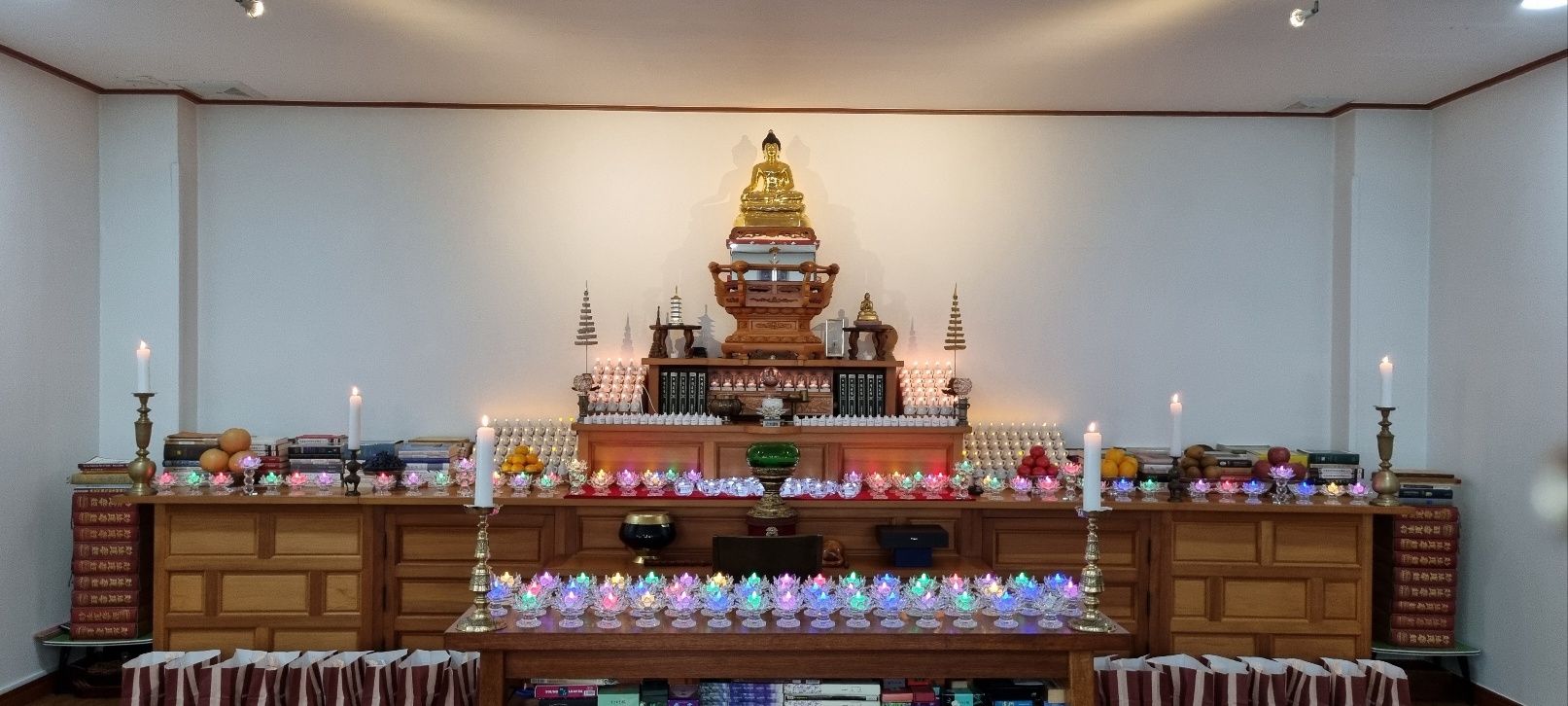 |
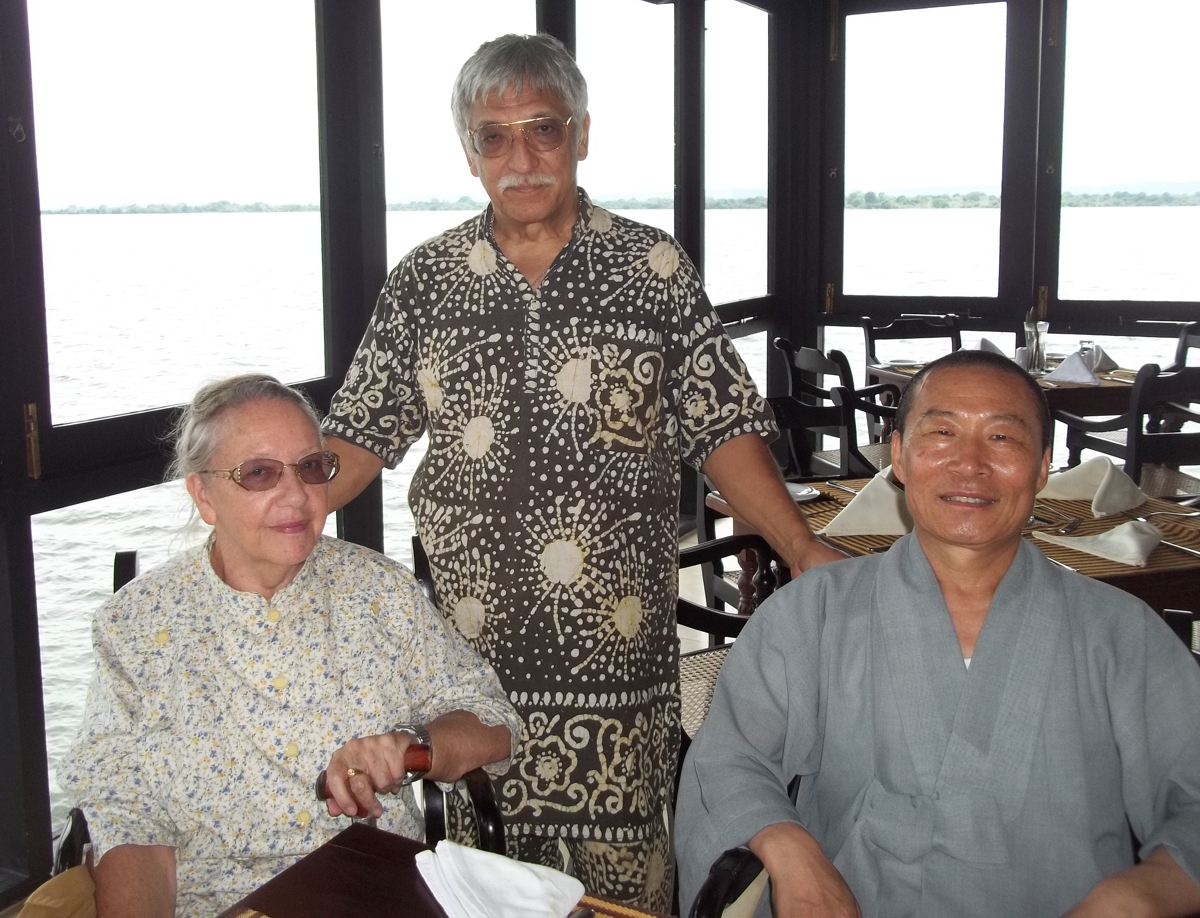 |
||||||||||||
|
Won Hyo Center, Pusan
|
Visakha, Ken, and Ven. Gong Pa Sunim in Polonnaruwa
|
The most recent photo of Ven. Gong Pa Sunim, 2024
|
|||||||||||
We are very comfortable in Kandy. Living here is really very easy. There is, however, one activity that we miss and wish we could organize here. In Flint, we were the Buddhist representatives on the Flint Interfaith Council, meeting regularly with pastors from various Christian churches, a Baha'i Counsellor, a Jewish Rabbi, and a Native American leader. We participated in Seders and multi-religious Thanksgiving services and demonstrated for Peace on Gandhi's birthday. The discussions were often inspiring and very educational. Every such council is also an avenue for understanding, mutual respect, and cooperation, as opposed to the prejudice and conflict so prevalent between religions. One of our fondest memories of a meeting of the Flint Interfaith Council was at Jerusalem Inn, an excellent Palestinian restaurant in Flint. The food was superb, and the decor was beautiful. Unfortunately, we have heard that the restaurant has gone out of business. We wonder where the Palestinian family is now. We wish them well.
We have been pleased to see the student demonstrations for a ceasefire and humanitarian aid for Gaza. Although it did not receive national attention, students at Ken's alma mater, Wesleyan University, also established a significant encampment. Quite unlike at Columbia and UCLA, the administration met with the protesters and discussed their demands, and the settlement was agreeable to all. No students were arrested, suspended, or punished for participating in the protest. We are also happy to know that our friends from Michigan Citizens for Peace, with whom we demonstrated every Sunday for months against the invasion of Iraq, are still active. If it were possible here, we would be out demonstrating as well.
Out of the blue, we had a very happy occasion last month. Unlike other Theravada countries: Thailand, Burma, Laos, and Cambodia, Sri Lanka has pretty much lost the tradition of pindapata, monks walking each morning to receive alms food. There are, however, a few monks, mostly foreign, it seems, who, once in while, at least, walk through neighborhoods for alms. Last year, our friend, Daniel, introduced us to Ven. Jinasiri, who upholds the forest tradition. In early May, he moved back to Kandy from his hermitage in the mountains, and informed us that he would be walking in our neighborhood for pindapata, but he did not give a date. One morning, Lily knocked on our bedroom door and announced that three monks had come for pindapata. We remembered that, in the refrigerator, there was an entire pizza (with a Ken-made whole wheat crust) that Lily had baked the day before. We asked her to give it to the monks, which she happily did. That afternoon, we wrote to Ven. Jinasiri, apologizing that we had not been able to meet him and asked whether he would be coming the next day. Several neighbors had seen him come to our house and wanted to join the next time he came. He replied that he would not be coming the next day, but that he would walk for pindapata in our neighborhood on Saturday. He came, we offered food, and several neighbors came with their curries. Ven. Jinasiri spoke with them and offered anumodana, and they we delighted. As soon as the monk had left, the neighbors asked Lily to ask us to invite the monk again, not only for pindapata, but to stay and give a Dhamma lesson. He readily agreed, and the date was set for Sunday, May 26. We invited our students in Kandy to join. It was a joyous event. All the food was arranged on tables, and our living room became the village streets for the monks and nun to walk around. Ven. Jinasiri's lesson was given in both Sinhala and English, and everyone was extremely gratified. We hope to be able to do this often!
 |
||
|
Ven. Nissarano
|
||
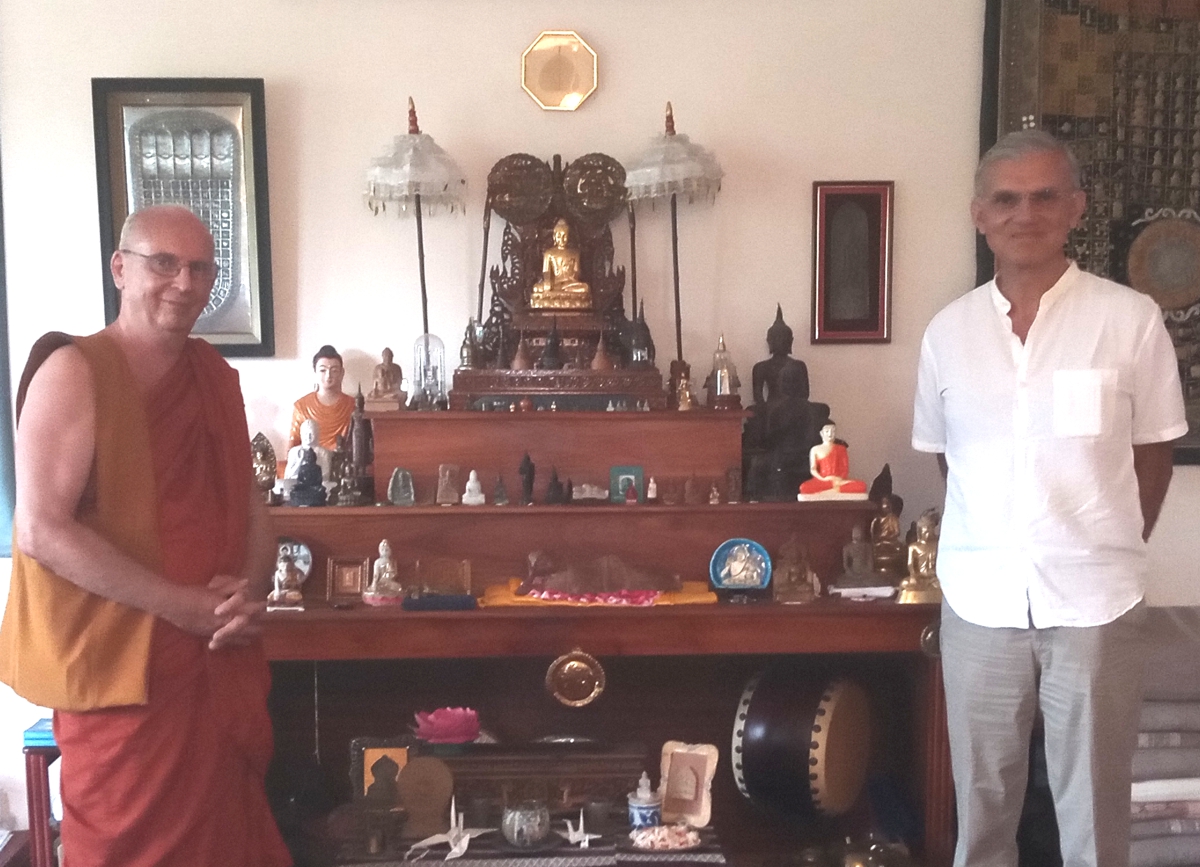 |
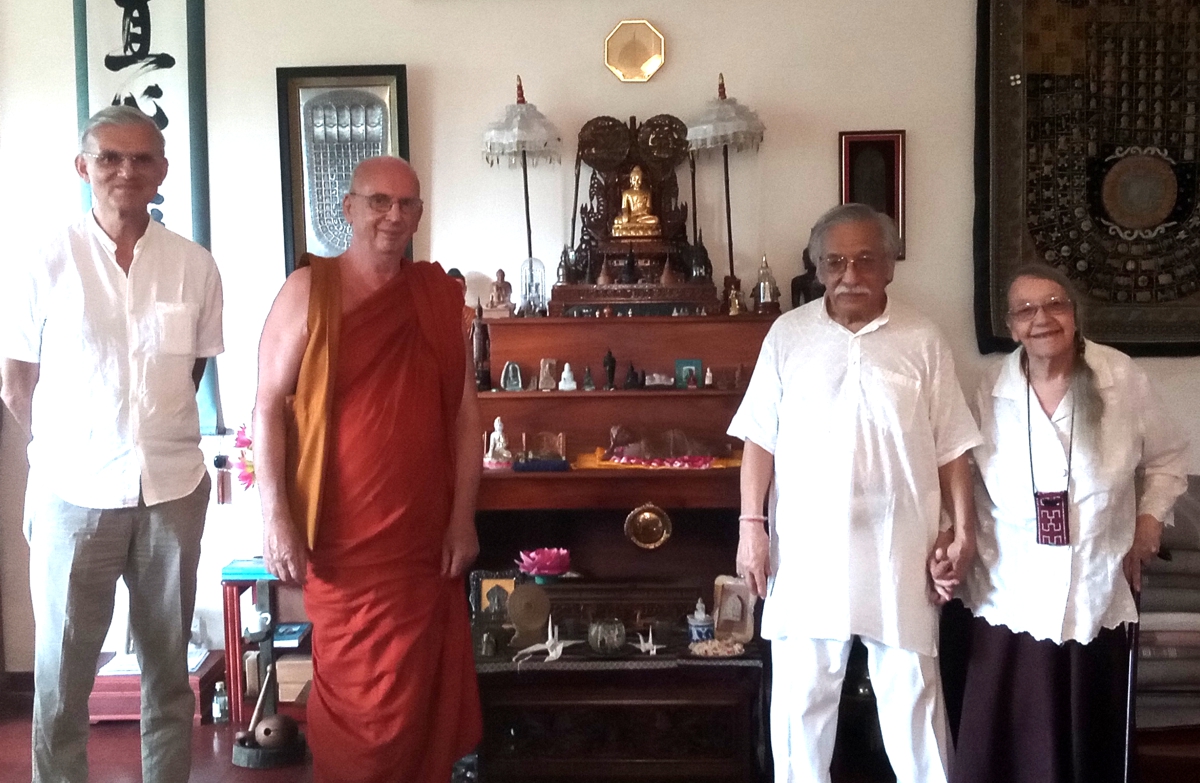 |
|||
|
Ven. Dhammika, Razeen, Ken, and Visakha
|
||||
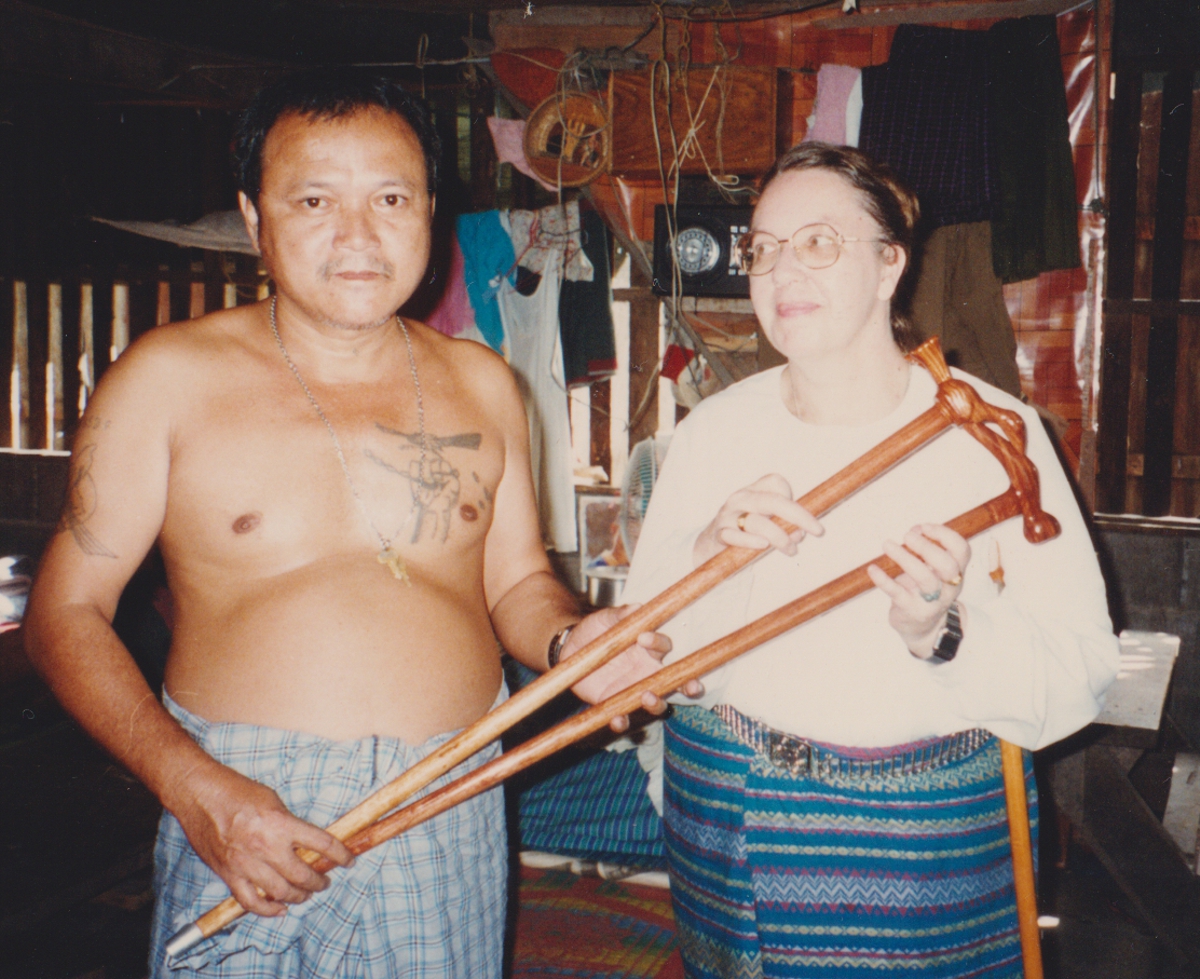 We don't get around much anymore. (It's hard to write that without singing it!) For several months, Ken has been wearing knee stabilizers part of every day, particlarly in the morning, and he uses a cane (custom-made with a fighting peacock handle by the carpenter at Mae Tao Clinic) most of the time. We welcome visitors from near and far.
We don't get around much anymore. (It's hard to write that without singing it!) For several months, Ken has been wearing knee stabilizers part of every day, particlarly in the morning, and he uses a cane (custom-made with a fighting peacock handle by the carpenter at Mae Tao Clinic) most of the time. We welcome visitors from near and far.
A few weeks ago, Isuru, a student from our class at Subodharama, who had gone to Australia for his MA in social work, returned to Sri Lanka to marry Tharushi, who is compleing her PhD, also in Australia..We were not able to attend the wedding in Colombo, but the couple came up to Kandy and visited us one evening for dinner. We were delighted to see the newlyweds. They have returned down under, where Isuru will be finding a job, while Tharushi continues her study in electrical engineering. Last week, with Uiversity of Colombo on strike, Dushy was able to visit Kandy and spent a day and a half with us. It is always a pleasure to see her, and we reminisced about meeting her in Michigan back in 2002, when she was working on her PhD in Ann Arbor . In early Aprrl, Daniel, a meditation teacher and retreat organizer, visited, just before he flew to South America, where he has helped to distribute copies of the Spanish translation of Volume 1 of the Spanish translation of Jataka Tales of the Buddha to Goenka meditation centers throughout the continent. He introduced us to several meditaors, German and Sri Lankan, from the session they had just completed. Our neighbor, Fahim, who spent years in Japan and speaks Japanese quite fluently (much better than us) drops by frequently, sometimes with Japanese he has met. A couple of weeks ago, he brought a couple who were touring the island before they got married.The young man testdrives automobiles in Japan, a profession we rarely think about. One afternoon, Ramesh, our resourceful local pharmacist, dropped in on his way home from a wedding and brought us some gifts, including the longyi Ken is wearing and a beautifully painted image of the Buddha, which is now on our altar.
A couple of weeks ago, we had a beautiful visitor to our garden and neighborhood. We have heard it several times in the "jungle" behind our house, but this was only the second time in ten years we have seen it--a PEACOCK! or more precisely, a peahen.
Just outside the kitchen, Lily has created a beautiful flowering wall. A few weeks ago, a much-awaited flower bloomed.
|
|||||||||||||||||||||
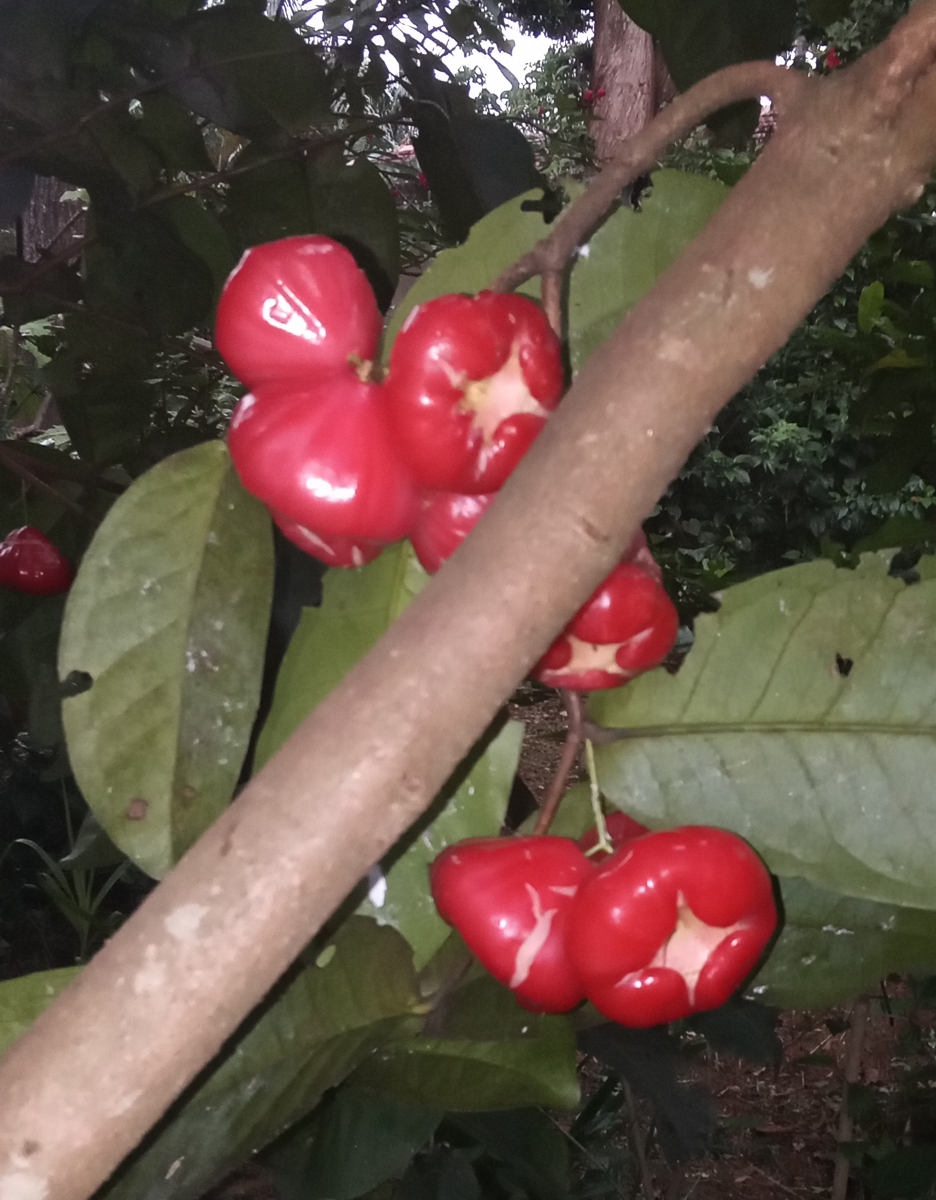 |
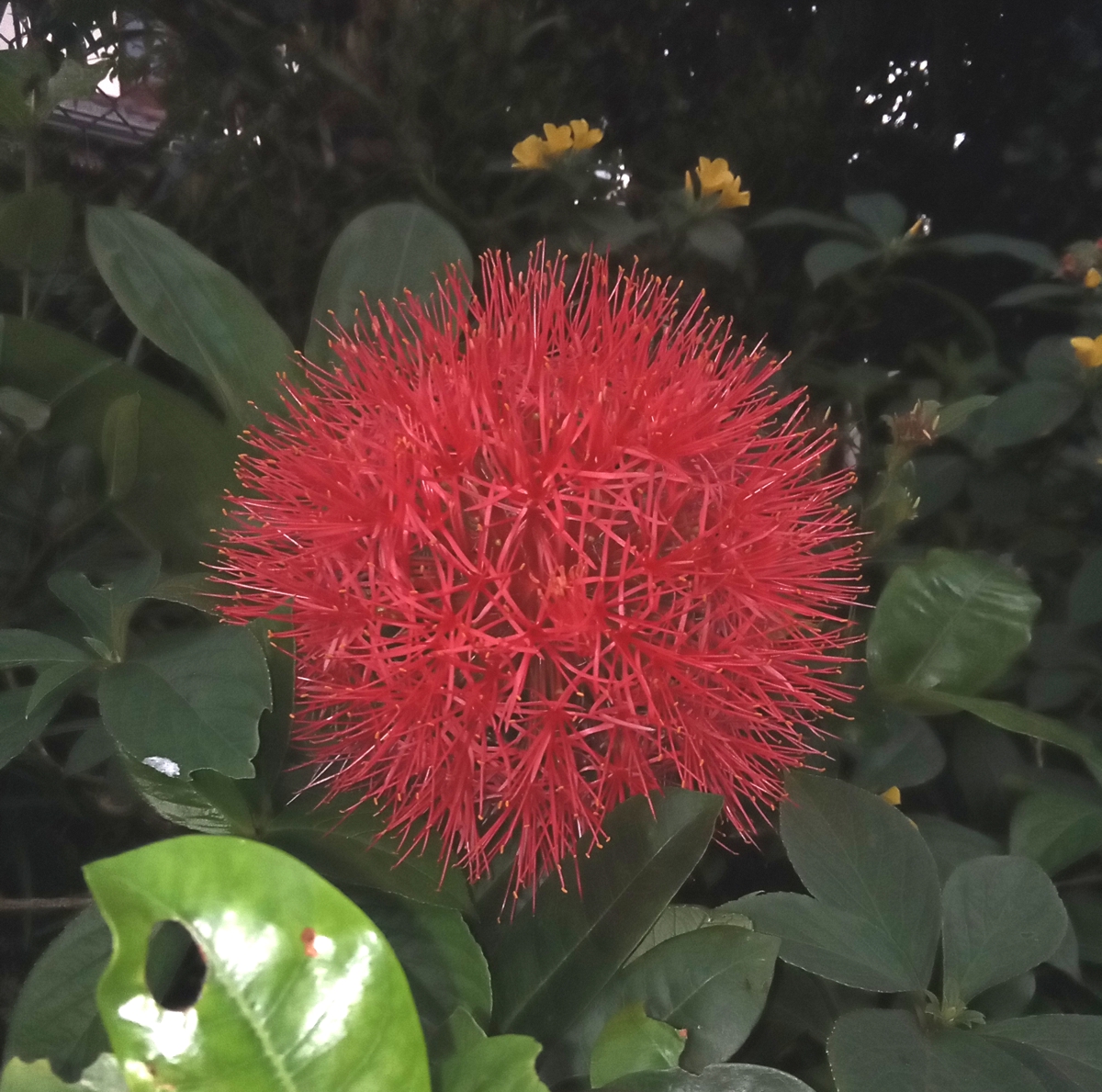 |
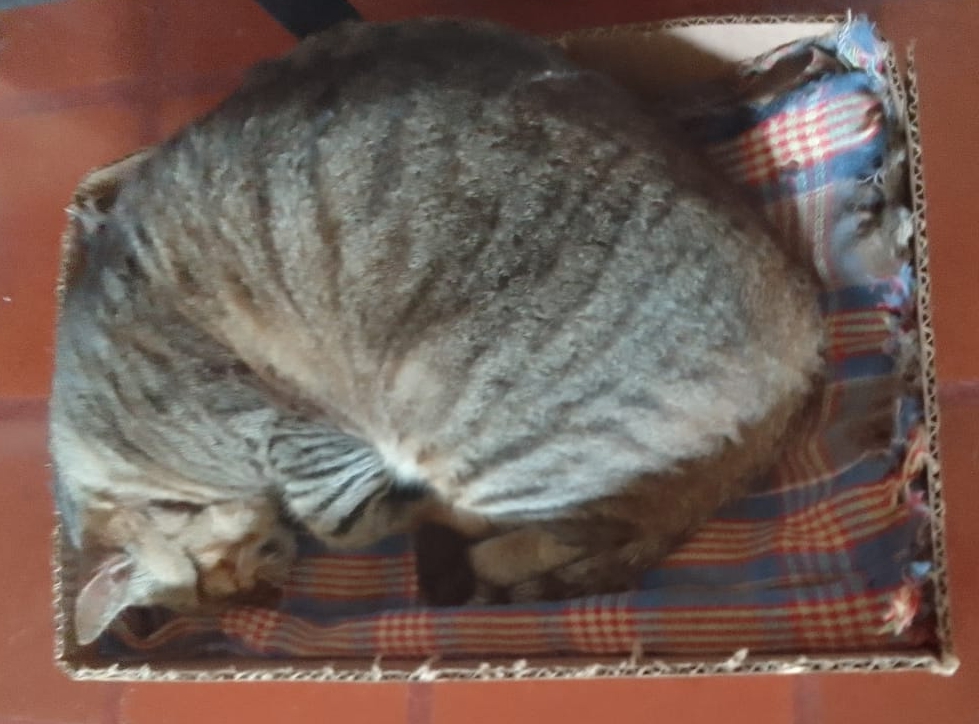 |
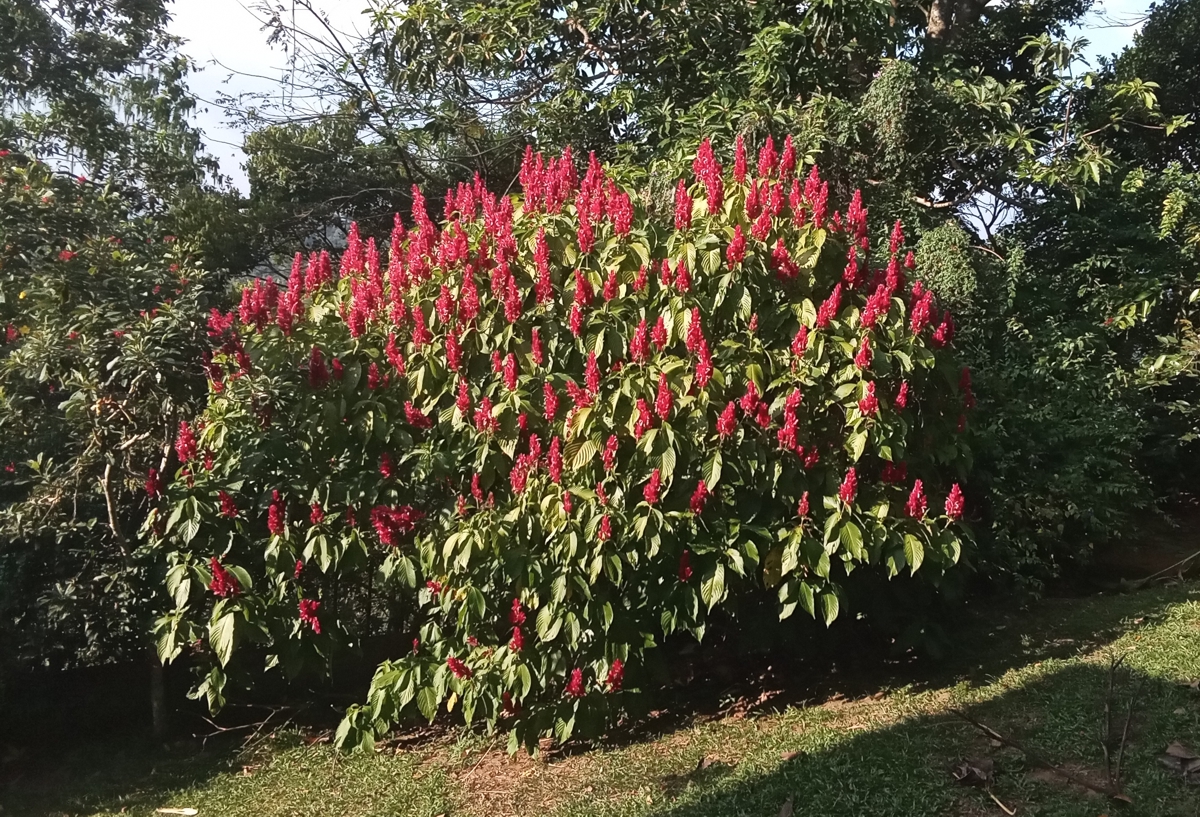 |
| This year we had a bumper crop of jambu (rose apple). Lots of jambu-mango crumble! | We have several blood liiles in the garden, but this perfect sphere amidst the green leaves, was outside the gate. | One morning, Lily noticed an abcess on the side of Leo's face. It was serious, and he had a high fever. With good care, he has recovered and loves the box we made for him. | Brazilian Plume Flower, one of the most splendiforous bushes in our garden. It blooms every year and stays like this for several months. We thank the Portugese for introducing this to Sri Lanka. |
|
|||||||||||||||
|
Congratulations!
|
|||||||||||||||
| I am very proud to announce the completion of my doctoral dissertation, titled "Pre-Institutional Buddhist Traditions in the Arthapada: A Comparative Study and Complete Annotated Translation of Its Chinese Translation Yizujing, Derived from an Indic Recension, and Its Pali Recension Atthakavagga." While this dissertation explores the lack of a distinctive Buddhist identity in the Atthakavagga through the study of epithets for the ideal person, its significant contribution to Buddhist studies lies in the complete annotated translation of the Yizujing. Each moment of uncovering the hidden meanings within the compact four, five, or six characters of the enigmatic Chinese verses was a thrilling process filled with eureka moments. Containing 306 Chinese verses and 210 Pali verses, this dissertation has now grown into to a comprehensive 272,000-word study. It is now available on the UC eScholarship website and will soon be accessible on ProQuest. |
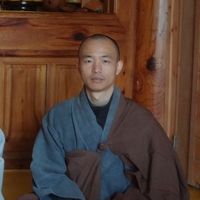 |
||||||||||||||
|
Bhikkhu Dukil (Seongryong Lee)
From South Korea One of our former students |
|||||||||||||||
| My journey toward this doctoral degree has been driven by unwavering passion and enthusiasm at every turn. Such a path would have been unimaginable without the incredible support and encouragement from many cherished individuals who have guided and inspired me along the way. To all who have walked this path with me—from 2009 to 2013 in Kandy, Sri Lanka studying ancient Indian languages, through 2013 to 2015 at the University of Virginia for my master’s degree, and from 2015 to 2024 during my doctoral studies at UCLA—thank you from the depths of my heart. Your guidance, support, and encouragement have not only propelled my academic endeavors but have also profoundly enriched the fabric of my life, weaving together a story of community, learning, and growth. June 11th 2024 |
|||||||||||||||
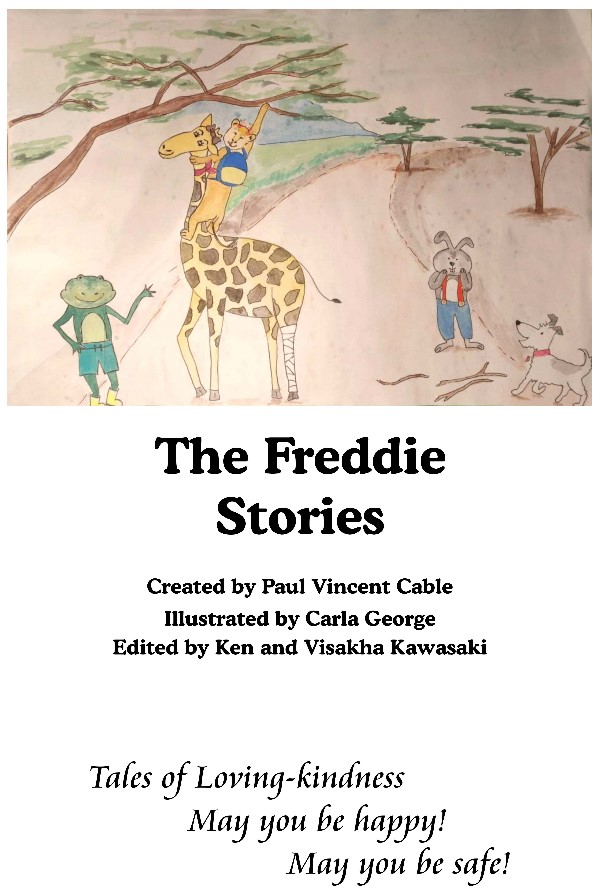
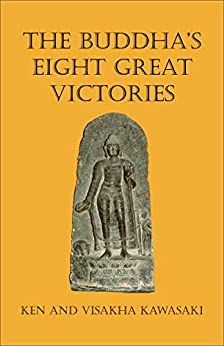 We are happy to report that Buddhist Cultural Centre is going forward with the publication of The Buddha's Eight Great Victories. We hope to see it in print in a couple of months. In the meantime, it is available from Amazon for the Kindle. Buddhist Cultural Centre has also expressed interest in publishing The Freddie Stories, by Paul Vincent Cable. We edited and formatted them last year, and they are available in PDF for free download on our website. We are sorry to announce that our edition of A Pilgrim's Companion is out of print. We are looking for a new publisher. An edition published in Kolkata by Maha Bodhi Book Agency is, however, available in India. A few copies are also still available at Pariyatti Bookstore online.
We are happy to report that Buddhist Cultural Centre is going forward with the publication of The Buddha's Eight Great Victories. We hope to see it in print in a couple of months. In the meantime, it is available from Amazon for the Kindle. Buddhist Cultural Centre has also expressed interest in publishing The Freddie Stories, by Paul Vincent Cable. We edited and formatted them last year, and they are available in PDF for free download on our website. We are sorry to announce that our edition of A Pilgrim's Companion is out of print. We are looking for a new publisher. An edition published in Kolkata by Maha Bodhi Book Agency is, however, available in India. A few copies are also still available at Pariyatti Bookstore online.